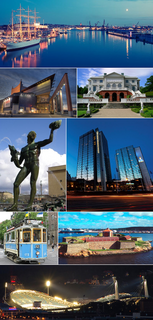
Gothenburg is the second-largest city in Sweden, fifth-largest in the Nordic countries, and capital of the Västra Götaland County. It is situated by Kattegat, on the west coast of Sweden, and has a population of approximately 570,000 in the city center and about 1 million inhabitants in the metropolitan area.

Malmö is the largest city of the Swedish county of Skåne County, the third-largest city in Sweden, after Stockholm and Gothenburg, and the sixth-largest city in Scandinavia, with a population of 312,012 inhabitants in 2017 out of a municipal total of 338,230. The Malmö Metropolitan Region is home to over 700,000 people, and the Øresund Region, which includes Malmö, is home to 4 million people.
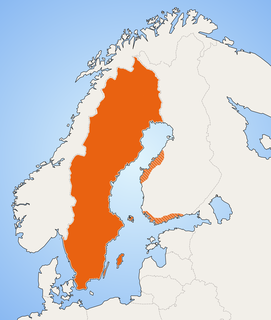
Swedish is a North Germanic language spoken natively by 10 million people, predominantly in Sweden, and in parts of Finland, where it has equal legal standing with Finnish. It is largely mutually intelligible with Norwegian and to some extent with Danish, although the degree of mutual intelligibility is largely dependent on the dialect and accent of the speaker. Both Norwegian and Danish are generally easier for Swedish speakers to read than to listen to because of difference in accent and tone when speaking. Swedish is a descendant of Old Norse, the common language of the Germanic peoples living in Scandinavia during the Viking Era. It has the most speakers of the North Germanic languages.
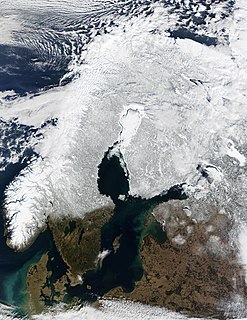
Scandinavia is a region in Northern Europe, with strong historical, cultural, and linguistic ties. The term Scandinavia in local usage covers the three kingdoms of Denmark, Norway, and Sweden. The majority national languages of these three, belong to the Scandinavian dialect continuum, and are mutually intelligible North Germanic languages. In English usage, Scandinavia also sometimes refers to the Scandinavian Peninsula, or to the broader region including Finland and Iceland, which is always known locally as the Nordic countries.
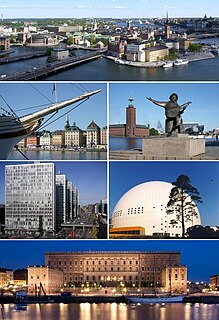
Stockholm is the capital of Sweden and the most populous urban area in the Nordic countries; 962,154 people live in the municipality, approximately 1.5 million in the urban area, and 2.3 million in the metropolitan area. The city stretches across fourteen islands where Lake Mälaren flows into the Baltic Sea. Just outside the city and along the coast is the island chain of the Stockholm archipelago. The area has been settled since the Stone Age, in the 6th millennium BC, and was founded as a city in 1252 by Swedish statesman Birger Jarl. It is also the capital of Stockholm County.

The Thirty Years' War was a war fought primarily in Central Europe between 1618 and 1648. One of the most destructive conflicts in human history, it resulted in eight million fatalities not only from military engagements but also from violence, famine, and plague. Casualties were overwhelmingly and disproportionately inhabitants of the Holy Roman Empire, most of the rest being battle deaths from various foreign armies. In terms of proportional German casualties and destruction, it was surpassed only by the period January to May 1945; one of its enduring results was 19th-century Pan-Germanism, when it served as an example of the dangers of a divided Germany and became a key justification for the 1871 creation of the German Empire.

The Great Northern War (1700–1721) was a conflict in which a coalition led by the Tsardom of Russia successfully contested the supremacy of the Swedish Empire in Northern, Central and Eastern Europe. The initial leaders of the anti-Swedish alliance were Peter I of Russia, Frederick IV of Denmark–Norway and Augustus II the Strong of Saxony–Poland–Lithuania. Frederick IV and Augustus II were defeated by Sweden, under Charles XII, and forced out of the alliance in 1700 and 1706 respectively, but rejoined it in 1709 after the defeat of Charles XII at the Battle of Poltava. George I of Great Britain and of Brunswick-Lüneburg (Hanover) joined the coalition in 1714 for Hanover and in 1717 for Britain, and Frederick William I of Brandenburg-Prussia joined it in 1715.

Carl XVI Gustaf is the King of Sweden. He ascended the throne on the death of his grandfather, King Gustaf VI Adolf, on 15 September 1973.

Charles XII, sometimes Carl or Latinized to Carolus Rex, was the King of Sweden from 1697 to 1718. He belonged to the House of Palatinate-Zweibrücken, a branch line of the House of Wittelsbach. Charles was the only surviving son of Charles XI and Ulrika Eleonora the Elder. He assumed power, after a seven-month caretaker government, at the age of fifteen.
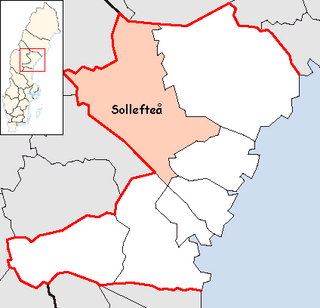
Sollefteå Municipality is a Swedish municipality in Västernorrland County. Its seat is located in Sollefteå.

The Sweden national football team represents Sweden in association football and is controlled by the Swedish Football Association, the governing body for football in Sweden. Sweden's home ground is Friends Arena in Stockholm and the team is coached by Janne Andersson. From 1945 to late 1950s, they were considered one of the greatest teams in Europe.

Zlatan Ibrahimović is a Swedish professional footballer who plays as a forward for LA Galaxy. Primarily a striker, he is a prolific goalscorer, who is best known for his technique, creativity, strength, ability in the air, and his powerful and accurate striking ability. He is currently the third-most decorated active footballer in the world, having won 31 trophies in his career. He has scored over 500 senior career goals for club and country.
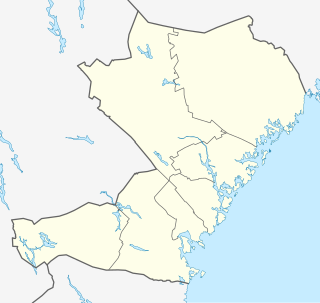
Ramsele is a locality situated in Sollefteå Municipality, Västernorrland County, Sweden with 968 inhabitants in 2010. Since the 1960s, the population has decreased from 1563 to 968. It is situated by the river Faxälven about 70 km north-west of Sollefteå. The oldest known name of the town is "Rannasild", according to a local book about the area. Later it was known as Hrafnasil, a name which probably originated from Old Norse, and literally meant 'Calm water of ravens'. The oldest evidence of settlement is a church from the late 13th century.

The Pirate Bay is an online index of digital content of entertainment media and software. Founded in 2003 by Swedish think tank Piratbyrån, The Pirate Bay allows visitors to search, download, and contribute magnet links and torrent files, which facilitate peer-to-peer (P2P) file sharing among users of the BitTorrent protocol.

Sweden, officially the Kingdom of Sweden, is a Scandinavian Nordic country in Northern Europe. It borders Norway to the west and north and Finland to the east, and is connected to Denmark in the southwest by a bridge-tunnel across the Öresund, a strait at the Swedish-Danish border. At 450,295 square kilometres (173,860 sq mi), Sweden is the largest country in Northern Europe, the third-largest country in the European Union and the fifth largest country in Europe by area. Sweden has a total population of 10.2 million of which 2.4 million has a foreign background. It has a low population density of 22 inhabitants per square kilometre (57/sq mi). The highest concentration is in the southern half of the country.

The Swedish Empire was a European great power that exercised territorial control over much of the Baltic region during the 17th and early 18th centuries. The beginning of the Empire is usually taken as the reign of Gustavus Adolphus, who ascended the throne in 1611, and its end as the loss of territories in 1721 following the Great Northern War.
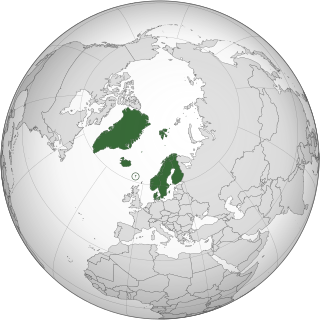
The Nordic countries or the Nordics are a geographical and cultural region in Northern Europe and the North Atlantic, where they are most commonly known as Norden. The term includes Denmark, Finland, Iceland, Norway, and Sweden, as well as Greenland and the Faroe Islands—which are both part of the Kingdom of Denmark—and the Åland Islands and Svalbard and Jan Mayen archipelagos that belong to Finland and Norway respectively, whereas the Norwegian Antarctic territories are often not considered a part of the Nordic countries, due to their geographical location. Scandinavians, who comprise over three quarters of the region's population, are the largest group, followed by Finns, who comprise the majority in Finland; other groups are indigenous minorities such as the Greenlandic Inuit and the Sami people, and recent immigrants and their descendants. The native languages Swedish, Danish, Norwegian, Icelandic, and Faroese are all North Germanic languages rooted in Old Norse. Native non-Germanic languages are Finnish, Greenlandic and several Sami languages. The main religion is Lutheran Christianity. The Nordic countries have much in common in their way of life, history, religion, their use of Scandinavian languages and social structure. The Nordic countries have a long history of political unions and other close relations, but do not form a separate entity today. The Scandinavist movement sought to unite Denmark, Norway and Sweden into one country in the 19th century, with the indepedence of Finland in the early 20th century, and Iceland in the mid 20th century, this movement expanded into the modern organised Nordic cooperation which includes the Nordic Council and the Nordic Council of Ministers. Especially in English, Scandinavia is sometimes used as a synonym for the Nordic countries, but that term more properly refers to the three monarchies of Denmark, Norway and Sweden. Geologically, the Scandinavian Peninsula comprises the mainland of Norway and Sweden as well as the northernmost part of Finland.
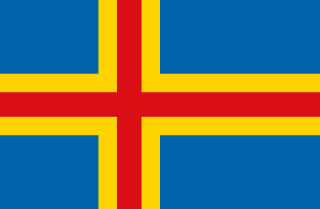
The Åland Islands or Åland is an archipelago province at the entrance to the Gulf of Bothnia in the Baltic Sea belonging to Finland. It is autonomous, demilitarised and is the only monolingually Swedish-speaking region in Finland. It is the smallest region of Finland, constituting 0.49% of its land area and 0.50% of its population.

Swedes are a North Germanic ethnic group native to Sweden. They mostly inhabit Sweden and the other Nordic countries, in particular Finland, with a substantial diaspora in other countries, especially the United States.

Storfinnforsen Hydroelectric Power Station is a run-of-the-river hydroelectric power station on the Faxälven, in Västernorrland County, Sweden.


















